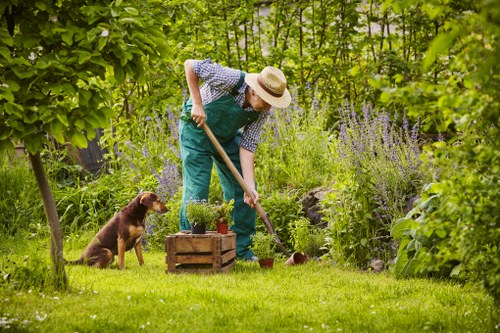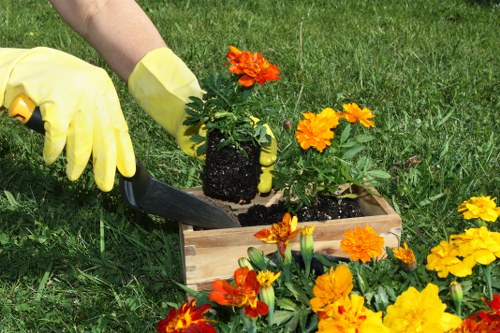Garden Maintenance in Barnet

Maintaining a beautiful garden in Barnet requires dedication, knowledge, and the right set of tools. Whether you're a seasoned gardener or a beginner, understanding the intricacies of garden maintenance can transform your outdoor space into a thriving oasis.
Barnet's unique climate and soil conditions offer both opportunities and challenges for garden enthusiasts. From managing seasonal changes to selecting the right plants, effective garden maintenance ensures that your garden remains vibrant and healthy throughout the year.
In this comprehensive guide, we'll explore the essential aspects of garden maintenance in Barnet, providing you with the insights needed to create and sustain a stunning garden.
Understanding the Basics of Garden Maintenance

Garden maintenance involves a series of tasks that support the health and aesthetics of your garden. This includes everything from watering and weeding to pruning and fertilizing. Consistent maintenance not only enhances the beauty of your garden but also promotes the growth and longevity of your plants.
In Barnet, gardeners must consider factors such as local climate, soil type, and native plant species. Tailoring your maintenance routine to these conditions can lead to a more sustainable and low-maintenance garden.
Regular maintenance tasks help prevent common garden issues, such as pest infestations and plant diseases. By staying proactive, you can address potential problems before they escalate, ensuring a thriving garden environment.
Key Components of Garden Maintenance

Watering is one of the most critical aspects of garden maintenance. Proper irrigation ensures that plants receive the necessary hydration without overwatering, which can lead to root rot and other issues.
Weeding keeps your garden beds free from unwanted plants that compete with your desired flora for nutrients and water. Regular weeding is essential to maintain the health and appearance of your garden.
Pruning helps in shaping plants, removing dead or diseased branches, and encouraging new growth. Proper pruning techniques vary depending on the type of plant and the desired outcome.
Seasonal Garden Care in Barnet

Gardening in Barnet requires adapting your maintenance practices to the seasons. Each season brings its own set of challenges and opportunities for garden care.
- Spring: Focus on planting new flowers, fertilizing the soil, and preparing garden beds.
- Summer: Emphasize regular watering, pest control, and mulching to retain soil moisture.
- Autumn: Conduct leaf removal, prepare plants for winter, and compost organic matter.
- Winter: Protect plants from frost, prune dormant shrubs, and plan for the upcoming gardening season.
Understanding and implementing seasonal maintenance routines can significantly enhance the resilience and beauty of your garden year-round.
Spring Maintenance Tips

Spring is a pivotal time for garden maintenance in Barnet. As the weather warms, it's essential to prepare your garden for the growing season ahead.
Start by cleaning up your garden beds, removing any debris from the winter months. This creates a clean slate for new plantings and reduces the risk of disease.
Additionally, consider fertilizing your plants to provide them with the necessary nutrients for robust growth. Mulching can also help retain soil moisture and suppress weeds.
Essential Tools for Effective Garden Maintenance

Having the right tools is fundamental to efficient garden maintenance. Equipped with the proper equipment, tasks become easier and more enjoyable.
Here are some essential tools every Barnet gardener should have:
- Pruning Shears: Ideal for trimming and shaping plants.
- Garden Fork: Useful for turning soil and composting.
- Watering Can or Hose: Ensures adequate watering of plants.
- Gloves: Protect your hands while working in the garden.
- Garden Trowel: Perfect for planting and weeding.
Investing in high-quality tools not only enhances your gardening efficiency but also ensures the longevity of your equipment.
Choosing the Right Tools for Your Garden

Selecting the appropriate tools depends on the specific needs of your garden. Consider factors such as the size of your garden, the types of plants you cultivate, and the nature of the maintenance tasks.
Ergonomic designs can reduce strain and fatigue, making gardening more comfortable. Regularly maintain your tools by cleaning and sharpening to ensure they perform optimally.
Additionally, storage solutions like tool sheds or designated storage areas can keep your tools organized and easily accessible.
Selecting the Right Plants for Barnet Gardens

Choosing plants that thrive in Barnet's climate is crucial for minimizing maintenance efforts and maximizing garden beauty.
Consider native plants, as they are well-adapted to the local environment and require less water and care. Incorporating a mix of perennials, annuals, shrubs, and trees can add diversity and resilience to your garden.
- Perennials: Plants that return year after year, such as lavender and hostas.
- Annuals: Seasonal flowers like petunias and marigolds that add vibrant color.
- Shrubs: Evergreen varieties that provide structure, such as boxwood and holly.
- Trees: Shade-providing species like oak and maple.
By selecting the right mix of plants, you can create a harmonious and low-maintenance garden environment.
Perennial vs. Annual Plants

Understanding the difference between perennials and annuals is key to successful garden planning. Perennials come back each year, reducing the need for replanting and establishing long-term structure in your garden.
Annuals, on the other hand, complete their life cycle within a single growing season. They are excellent for adding seasonal color and filling in gaps in your garden design.
In Barnet, combining both types can provide continuous blooms and foliage, ensuring your garden remains attractive throughout the year.
Lawn Care and Maintenance

A well-maintained lawn serves as the foundation of your garden. Proper lawn care enhances the overall appearance and provides a healthy environment for other plants.
Key aspects of lawn maintenance in Barnet include mowing, fertilizing, aerating, and overseeding.
- Mowing: Regular mowing promotes even growth and prevents grass from becoming overgrown.
- Fertilizing: Provides essential nutrients to keep the grass healthy and green.
- Aerating: Helps improve soil oxygen levels and water penetration.
- Overseeding: Introduces new grass varieties to enhance density and resilience.
Implementing these practices ensures a lush and resilient lawn that complements the rest of your garden.
Preventing Common Lawn Problems

Maintaining a healthy lawn involves identifying and addressing common issues such as pests, diseases, and nutrient deficiencies.
Regular inspections can help detect problems early. For instance, signs of grub infestations or fungal infections should be addressed promptly to prevent widespread damage.
Additionally, ensuring proper drainage and avoiding overwatering can mitigate many common lawn problems.
Pruning and Trimming Techniques

Pruning and trimming are essential for maintaining the shape, health, and productivity of your plants. Proper techniques can encourage robust growth and prevent diseases.
Different plants require different pruning methods. For example, fruit trees benefit from shaping cuts that promote airflow, while flowering shrubs may need trimming to encourage blooming.
- Identify the Right Time: Prune at times that align with the plant's growth cycle.
- Use Sharp Tools: Clean, sharp tools make precise cuts and reduce the risk of damaging the plant.
- Remove Dead or Diseased Branches: This helps maintain plant health and aesthetics.
- Shape the Plant: Trim to achieve the desired form and encourage balanced growth.
Consistent pruning not only enhances the appearance of your garden but also contributes to the overall health of your plants.
Tools for Effective Pruning

Having the right tools is crucial for effective pruning and trimming. Essential tools include:
- Hand Pruners: Perfect for small branches and precise cuts.
- Pruning Saws: Necessary for larger branches that hand pruners can't handle.
- Loppers: Ideal for medium-sized branches with extended reach.
- Pruning Shears: Suitable for shaping and trimming plants.
Regular maintenance of these tools ensures clean cuts and extends their lifespan.
Managing Garden Pests and Diseases

Effective pest and disease management is vital for maintaining a healthy garden. Barnet gardeners face challenges from various pests and plant diseases that can hinder growth and reduce productivity.
Integrating integrated pest management (IPM) strategies can help control pest populations while minimizing environmental impact.
Common garden pests in Barnet include aphids, slugs, and beetles, while diseases like powdery mildew and rust can affect plant health. Early detection and appropriate treatment are key to managing these issues.
Organic Pest Control Methods

For eco-conscious gardeners, organic pest control methods offer effective solutions without harming the environment. Some popular organic methods include:
- Beneficial Insects: Introducing natural predators like ladybugs to control pest populations.
- Neem Oil: A natural pesticide that disrupts the life cycle of pests.
- Garlic Spray: Repels a variety of garden pests with its strong scent.
- Handpicking: Manually removing pests from plants.
These methods promote a balanced ecosystem in your garden, reducing the need for chemical interventions.
Maintaining Soil Health with Mulching

Mulching plays a critical role in maintaining soil health and enhancing garden aesthetics. It involves covering the soil surface with organic or inorganic materials to provide various benefits.
Benefits of Mulching:
- Moisture Retention: Helps keep the soil hydrated by reducing evaporation.
- Weed Suppression: Prevents weed growth by blocking sunlight.
- Temperature Regulation: Insulates the soil, keeping it cooler in summer and warmer in winter.
- Soil Enrichment: Organic mulches decompose over time, adding nutrients to the soil.
Choosing the right type of mulch depends on your garden needs and aesthetic preferences.
Types of Mulch for Barnet Gardens

There are two main categories of mulch: organic and inorganic.
Organic Mulch: Includes materials like bark, straw, compost, and leaf litter. It enriches the soil as it breaks down, promoting healthy plant growth.
Inorganic Mulch: Consists of materials like gravel, rubber, and landscape fabrics. While it doesn't decompose, it effectively suppresses weeds and retains soil moisture.
Selecting the appropriate mulch type enhances both the functionality and visual appeal of your garden.
Implementing Sustainable Gardening Practices

Sustainable gardening emphasizes eco-friendly practices that minimize environmental impact while promoting garden health. Adopting sustainable methods can lead to a more resilient and low-maintenance garden.
Key sustainable practices include:
- Composting: Recycling organic waste into nutrient-rich compost for soil enrichment.
- Rainwater Harvesting: Collecting and using rainwater for irrigation to conserve water resources.
- Native Plant Selection: Choosing plants adapted to the local climate reduces the need for excessive watering and care.
- Integrated Pest Management: Using natural pest control methods to maintain a balanced ecosystem.
Incorporating these practices contributes to a healthier garden and a more sustainable environment.
Benefits of Sustainable Gardening

Sustainable gardening offers numerous benefits, including:
- Environmental Conservation: Reduces the use of harmful chemicals and conserves natural resources.
- Cost Efficiency: Lowers maintenance costs by utilizing natural fertilizers and water sources.
- Biodiversity: Promotes a diverse ecosystem, supporting various plant and animal species.
- Soil Health: Enhances soil structure and fertility through organic practices.
These advantages make sustainable gardening a valuable approach for Barnet gardeners seeking long-term garden health.
Hiring Professional Garden Maintenance Services

While DIY garden maintenance is rewarding, hiring professional services can provide expertise and save time. Professional gardeners in Barnet offer a range of services tailored to your garden's specific needs.
Benefits of hiring professionals include:
- Expert Knowledge: Professionals possess in-depth knowledge of plant care, soil management, and pest control.
- Time Savings: Outsourcing maintenance tasks frees up your time for other activities.
- Quality Results: Professionals ensure high-quality care, resulting in a well-maintained and aesthetically pleasing garden.
- Customized Services: Tailored maintenance plans address the unique requirements of your garden.
Investing in professional garden maintenance can enhance the overall health and beauty of your outdoor space.
Choosing the Right Garden Maintenance Service

Selecting a reliable garden maintenance service involves considering factors such as experience, range of services, and customer reviews.
Ensure that the service provider is knowledgeable about Barnet's local conditions and can offer customized solutions to meet your garden's specific needs.
Additionally, clear communication and a well-defined maintenance plan are essential for successful collaboration with your chosen service provider.
Conclusion

Effective garden maintenance in Barnet involves a combination of regular care, the right tools, appropriate plant selection, and sustainable practices. Whether you choose to maintain your garden yourself or enlist professional help, understanding these key elements will ensure a thriving and beautiful outdoor space.
By adapting your maintenance routines to the seasons, managing soil health, and employing eco-friendly methods, you can create a resilient garden that brings joy and tranquility year-round.
Ready to elevate your garden? Contact us today to explore our professional garden maintenance services and transform your Barnet garden into a lush, vibrant sanctuary.